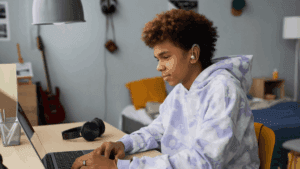Living off-campus can offer students more independence and flexibility, but it also comes with increased responsibility for personal safety. Whether you’re renting an apartment, sharing a house, or staying in a dormitory-style complex, it’s essential to take proactive steps to ensure your safety and well-being.
Safety Tips for Students Living in Off-Campus Housing
This guide will provide practical tips on how students can stay safe in off-campus housing.
1. Choose Your Location Wisely
- Research the Area: Before signing a lease, take the time to research the neighborhood. Look for crime statistics, safety ratings, and reviews from previous tenants. Use local law enforcement websites or platforms like NeighborhoodScout to get an idea of how safe the area is.
- Visit the Area at Different Times: Go to the neighborhood during the day and at night to get a sense of what it’s like at various times. This will help you determine if it’s quiet and safe, or if there are signs of trouble like poorly lit areas or high foot traffic late at night.
2. Secure Your Living Space
- Change the Locks: If possible, change the locks when you move in. If the landlord can’t or won’t do it, ask them to provide new keys. Previous tenants, maintenance workers, or others may still have access.
- Install Extra Security Features: Consider adding a deadbolt, peephole, or chain lock to your door. For added security, use a security system if the property allows it or install smart home devices like cameras or motion sensors.
- Secure Windows and Balconies: Ensure windows are locked, especially if you’re on the ground floor. Use window locks or reinforce them with security bars if necessary. If you live in a building with balconies, make sure the balcony door has a reliable lock, and never leave it open when you’re not home.
3. Be Cautious with Visitors and Roommates
- Know Who You’re Living With: If you’re renting with roommates, ensure you trust the people you’re sharing the space with. Vet roommates through background checks, personal references, or mutual friends if possible.
- Limit Stranger Access: Do not let people you don’t know into your home, even if they claim to know your roommates. Always verify their identity before opening the door. If you’re unsure, ask them to wait outside while you confirm with your housemates.
- Set Boundaries and Safety Protocols: Establish house rules with your roommates about visitors. Make sure everyone feels comfortable about who can and cannot visit, and agree on safe ways to handle emergencies or unexpected situations.
4. Practice Personal Safety Habits
- Always Lock Doors and Windows: Never leave doors or windows unlocked, even if you’re only stepping out for a short time. This includes both your front door and any side or balcony access.
- Use a Door Stopper or Security Bar: Consider using a door stopper or security bar when you’re inside your apartment, especially if you’re home alone. These provide an extra layer of protection.
- Keep Emergency Numbers Handy: Save local emergency numbers on your phone and in a visible location in your home. Include numbers for police, fire, medical services, and a trusted friend or family member.
Recommended for you: NSFAS Allowances 2025: Full Breakdown of Payment Amounts
5. Be Aware of Your Surroundings
- Walk in Groups: If you need to walk around the neighborhood at night, try to do so with a group of friends or roommates. Walking in pairs or groups reduces the likelihood of being targeted by criminals.
- Avoid Distractions: Don’t walk around with your headphones on or be absorbed in your phone when you’re outside. Stay alert to your surroundings, especially at night or in unfamiliar areas.
- Know the Safe Routes: Plan your walking routes and know where the well-lit streets, public transport stops, or places where help is available are located. Avoid shortcuts through isolated areas or alleys after dark.
6. Prepare for Emergencies
- Create an Emergency Kit: Have a well-stocked emergency kit that includes a flashlight, batteries, first aid supplies, a charged phone, and important documents like IDs and insurance policies.
- Know Emergency Exits: Familiarize yourself with the emergency exits in your building, especially in multi-unit complexes. Make sure that you have access to a fire escape route or a designated exit in case of an emergency.
- Keep a Phone on You: Always keep your phone charged and within reach, especially when going out at night or walking alone. Consider a portable charger if you’re out for long periods.
7. Report Suspicious Activity
- Be Proactive: If you notice something unusual, such as unfamiliar people loitering around your building or hearing strange noises, report it to your landlord or local authorities immediately.
- Keep Communication Open: Stay in contact with your neighbors. If there are any concerns or safety issues, having an open line of communication can help everyone stay informed and safe.
8. Maintain Good Relationships with Landlords and Neighbors
- Know Your Landlord’s Role: Ensure your landlord is proactive about maintaining safety measures, like working locks, security lighting, and routine property maintenance. If you encounter any safety hazards, make sure to notify them promptly.
- Engage with Neighbors: Getting to know your neighbors helps create a sense of community and safety. They can look out for you and vice versa, and you can share information about potential safety concerns in the neighborhood.
9. Avoid Sharing Too Much Information Online
- Protect Your Privacy: Avoid posting detailed information about your location or plans on social media, especially when you’re not at home. Publicly sharing your absence could make your place an easy target for burglars.
- Be Mindful of Location Tags: Think twice before using location tags on social media apps that show exactly where you are. Limit who can see your posts by adjusting your privacy settings.
Read more: Safety Tips for Sharing Accommodation with a New Roommate
10. Take Advantage of Campus Resources
- Campus Safety Services: Many universities offer safety escorts, late-night transport, or security services. Find out what’s available on your campus and use these resources if necessary.
- Safety Education: Attend any safety seminars or workshops offered by your school. These can provide useful tips for staying safe both on and off-campus.
By taking these safety precautions, students can significantly reduce the risks associated with living off-campus and ensure a safer living experience. The key is to stay vigilant, proactive, and prepared for emergencies. Safety is a shared responsibility between you, your roommates, your landlord, and your community.










